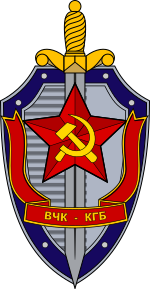Committee for State Security: Difference between revisions
From ProleWiki, the proletarian encyclopedia
More languages
More actions
(Created) Tag: Visual edit |
mNo edit summary Tag: Visual edit |
||
| (One intermediate revision by one other user not shown) | |||
| Line 1: | Line 1: | ||
{{Infobox organization|native_name=Комитет государственной безопасности|organization_name=Committee for State Security|founded=13 March 1954|dissolved=3 December 1991|logo=KGB logo.svg|logo_size=150|native_name_lang=Russian|organization_motto=Верность партии — верность родине}} | {{Infobox organization|native_name=Комитет государственной безопасности|organization_name=Committee for State Security|founded=13 March 1954|dissolved=3 December 1991|logo=KGB logo.svg|logo_size=150|native_name_lang=Russian|organization_motto=Верность партии — верность родине}}{{Message box/Stub}} | ||
The '''Committee for State Security''' ('''CSS'''), known as the '''KGB''' by its Russian acronym, was the main security agency of the [[Union of Soviet Socialist Republics (1922–1991)|Soviet Union]] from 1954 to 1991. | The '''Committee for State Security''' ('''CSS'''), known as the '''KGB''' by its Russian acronym, was the main security agency of the [[Union of Soviet Socialist Republics (1922–1991)|Soviet Union]] from 1954 to 1991. | ||
| Line 13: | Line 13: | ||
== References == | == References == | ||
[[Category: | <references /> | ||
[[Category: | [[Category:Stubs]] | ||
[[Category:Socialist intelligence agencies]] | |||
Latest revision as of 19:37, 2 July 2023
Committee for State Security | |
|---|---|
Комитет государственной безопасности | |
 | |
| Founded | 13 March 1954 |
| Dissolved | 3 December 1991 |
 | This article is a stub. You can help improve this article by editing it. |
The Committee for State Security (CSS), known as the KGB by its Russian acronym, was the main security agency of the Soviet Union from 1954 to 1991.
History[edit | edit source]
Yuri Andropov became Chairman of the KGB in 1967 and held the post until 1982. During this period, the KGB investigated and dismissed party officials for corruption and black market activities.[1]
See also[edit | edit source]
References[edit | edit source]
- ↑ Roger Keeran, Thomas Kenny (2010). Socialism Betrayed: Behind the Collapse of the Soviet Union: 'Two Trends in Soviet Politics' (pp. 48–50). [PDF] iUniverse.com. ISBN 9781450241717
